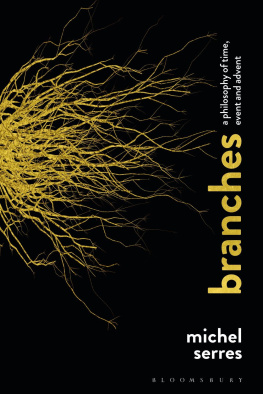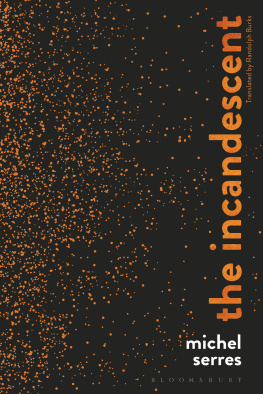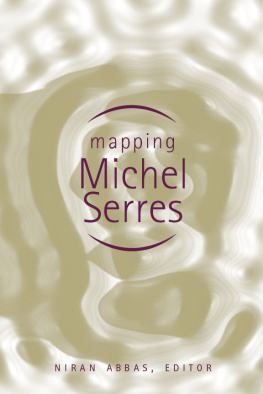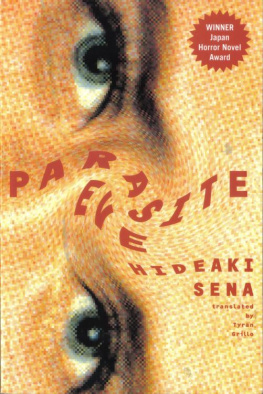Michel Serres - The Parasite
Here you can read online Michel Serres - The Parasite full text of the book (entire story) in english for free. Download pdf and epub, get meaning, cover and reviews about this ebook. City: London;Minneapolis, year: 2007, publisher: University of Minnesota Press, genre: Science. Description of the work, (preface) as well as reviews are available. Best literature library LitArk.com created for fans of good reading and offers a wide selection of genres:
Romance novel
Science fiction
Adventure
Detective
Science
History
Home and family
Prose
Art
Politics
Computer
Non-fiction
Religion
Business
Children
Humor
Choose a favorite category and find really read worthwhile books. Enjoy immersion in the world of imagination, feel the emotions of the characters or learn something new for yourself, make an fascinating discovery.

- Book:The Parasite
- Author:
- Publisher:University of Minnesota Press
- Genre:
- Year:2007
- City:London;Minneapolis
- Rating:5 / 5
- Favourites:Add to favourites
- Your mark:
- 100
- 1
- 2
- 3
- 4
- 5
The Parasite: summary, description and annotation
We offer to read an annotation, description, summary or preface (depends on what the author of the book "The Parasite" wrote himself). If you haven't found the necessary information about the book — write in the comments, we will try to find it.
The Parasite — read online for free the complete book (whole text) full work
Below is the text of the book, divided by pages. System saving the place of the last page read, allows you to conveniently read the book "The Parasite" online for free, without having to search again every time where you left off. Put a bookmark, and you can go to the page where you finished reading at any time.
Font size:
Interval:
Bookmark:
The Parasite
 CARY WOLFE, SERIES EDITOR
CARY WOLFE, SERIES EDITOR
2 The Poetics of DNA
Judith Roof
1 The Parasite
Michel Serres
Michel Serres
Translated by Lawrence R. Schehr
With a New Introduction by Cary Wolfe
posthumanities 1

Originally published as Le Parasite, copyright Grasset & Fasquelle, 1980.
Translation copyright 1982 by The Johns Hopkins University Press;
reprinted by arrangement with The Johns Hopkins University Press.
First University of Minnesota Press edition, 2007
Bring the Noise: The Parasite and the Multiple Genealogies of Posthumanism
copyright 2007 by the Regents of the University of Minnesota
All rights reserved. No part of this publication may be reproduced, stored in a retrieval system, or transmitted, in any form or by any means, electronic, mechanical, photocopying, recording, or otherwise, without the prior written permission of the publisher.
Published by the University of Minnesota Press
111 Third Avenue South, Suite 290
Minneapolis, MN 55401-2520
http://www.upress.umn.edu
Library of Congress Cataloging-in-Publication Data
Serres, Michel.
[Parasite. English]
The parasite / Michel Serres ; translated by Lawrence R. Schehr ; with a new introduction by Cary Wolfe.1st University of Minnesota Press ed.
p. cm.(Posthumanities ; v. 1)
ISBN 978-0-8166-4881-8 (pb : alk. paper)
I. Schehr, Lawrence R. II. Title.
PQ2679.E679P313 2007
844.914dc22
2006103042
Printed in the United States of America on acid-free paper
The University of Minnesota is an equal-opportunity educator and employer.
17 16 15 14 13 12 11 10 10 9 8 7 6 5 4 3
Bring the Noise: The Parasite and the Multiple
Genealogies of Posthumanism Cary Wolfe
Logics
Cascades
Host/Guest
The Obscure and the Confused
The Excluded Third, Included
The Simple Arrow
Difference and the Construction of the Real
The New Balance
Technique, Work
Diode, Triode
Machines and Engines
Interlude
Full-Length Portrait of the Parasite
Economy
Stercoral Origin of Property Rights
Exchange of Money, the Exact and the Fuzzy
Theory of the Joker
The Sun and the Sign
Stocks
Theory of the Line
Society
Analyze, Paralyze, Catalyze
Masters and Slaves
On Love
On Love
Michel Serres, the polymath, presents his translator with an extremely arduous task. A difficult style, multilingual puns, a wealth of knowledge and referencesall combine to make the text not at all easy to elucidate.
Two words merit brief mention in this preface. The first is the title, parasite. In French, the word has three meanings: a biological parasite, a social parasite, and static. The English parasite corresponds only to the first two meanings in French. Thus the reader should always be aware of this additional resonance in the French that is not translatable into English. The second word is hte, which corresponds to both host and guest in English. I have used guest and host in English where one of the two meanings was implied more than the other, but the other word is always implicitly present. At times, I have used the two together to reinforce the double meaning.
I should like to thank Michel Serres for his help with certain passages.
Verne, Leibniz, Carpaccio, Musil, Lucretius, Turner, and now La Fontaine: a heterogeneous list united only by the fact that they have all been objects of Michel Serress acute observations. Fueled by his varied background, his capacious knowledge of many disciplines, and his perceptive insights, these studies, along with many others, have been widely greeted as seminal, if not to say revolutionary, works. A selection of his earlier works has recently been translated and published as Michel Serres, Hermes: Literature, Science, Philosophy, edited by Josu V. Harari and David F. Bell (Baltimore: The Johns Hopkins University Press, 1981). Most of these essays deal with communication in a general sense: with the translation or interference (inter-reference) of two seemingly distinct fields. Serres analyzes the fundamental systems at work in a text as well as how these systems are analogous to those of another text from a different discipline: Turner and Carnot, or Zola and the theory of thermodynamics. For Serres, the human sciences, notably literature, painting, and philosophy, are not as far removed from the hard sciences, especially physics and mathematics, as the practitioners in one or the other of these disciplines might believe.
With the publication of Herms IV: La Distribution and La Naissance de la physique dans le texte de Lucrce in 1977, Serres enters a new and more radical phase in his work. Radical: the root, the beginning, the origin; radical: the revolutionary. In La Distribution he begins to ask questions and give answers about origins and rootsof language, of time, and of space. La Naissance de la physique is ostensibly a text on the beginning of atomist theory in Lucretiuss De natura rerum. Serres shows modern science, that is to say, physics and its theories, to be older than had been thought; its roots are not in the Renaissance but in Rome. But in one long text in this book on Lucretius, in a chapter entitled Violence et contrat (included in the collection of translated essays), Serres goes even further back in his speculations and investigations. He begins to examine the threshold of culture, its origin, inception, root, and direction. It is an origin grounded in violence and polarization, in inclusion and exclusion. And this chapter is also a first sketch for Serres of his theory of human relations, a theory that takes shape in this book, The Parasite.
The Parasite starts with an author, as do many of Serress other works; in this case it is Jean de La Fontaine, the author of the Fables. Serres develops his theory of human relations, the theory of the parasitebe it noise, guest, leech, or all threewith the support of a series of texts including La Fontaine, Rousseau, Molire, and the Acts of the Apostles. For Serres, the parasite is the primordial, one-way, and irreversible relation that is the base of human institutions and disciplines: society, economy, and work; human sciences and hard sciences; religion and history. All of these have the parasitic relation as their basic and fundamental component. Serres demonstrates this for each with equal facility and equal virtuosity, speaking the language of each of these fields and in the many-tongued, pentecostal language that for him is capable of discussing all these disciplines and institutions: the language of philosophy.
The parasite is a microbe, an insidious infection that takes without giving and weakens without killing. The parasite is also a guest, who exchanges his talk, praise, and flattery for food. The parasite is noise as well, the static in a system or the interference in a channel. These seemingly dissimilar activities are, according to Michel Serres, not merely coincidentally expressed by the same word (in French). Rather, they are intrinsically related and, in fact, they have the same basic function in a system. Whether it produces a fever or just hot air, the parasite is a thermal exciter. And as such, it is both the atom of a relation and the production of a change in this relation. Through a careful and cogent analysis of these various threads, Michel Serres produces an elegant theory of human relations and institutions, all of which have the same common factor: the parasite.
Next pageFont size:
Interval:
Bookmark:
Similar books «The Parasite»
Look at similar books to The Parasite. We have selected literature similar in name and meaning in the hope of providing readers with more options to find new, interesting, not yet read works.
Discussion, reviews of the book The Parasite and just readers' own opinions. Leave your comments, write what you think about the work, its meaning or the main characters. Specify what exactly you liked and what you didn't like, and why you think so.








